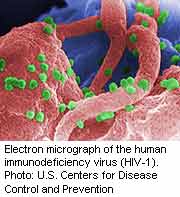
TUESDAY, Oct. 16 (HealthDay News) — A vaginal ring tested in sheep appears able to release an HIV drug for up to three months, scientists report.
An anti-HIV vaginal ring could allow sexually active women to gain some protection against the virus without relying on her partner to use a condom.
The research is in the preliminary stages, and because the device — one of several that are under development — hasn’t been tested in women yet, it is unknown if it will work in people. Experts point out that results from animal research do not always apply to humans.
But if further studies show it works in women, the device could be used for more than prevention of infection with the virus that causes AIDS, the researchers pointed out in a news release from the American Association of Pharmaceutical Scientists.
“We anticipate that this next-generation ring will be able to release a spectrum of drugs that currently cannot be delivered due to limitations of standard technology,” lead researcher Patrick Kiser, an associate professor at the University of Utah, said in the news release.
“This ring is a breakthrough design because it is highly adaptable to almost any drug; the amount of drug delivered each day is the same and the release rate can be modified easily if needed,” Kiser added.
For the study, the researchers tested the diaphragm-like ring on sheep and found that it was able to release appropriate levels of the HIV drug tenofovir, which can prevent the sexual transmission of the virus. A tenofovir gel is available for use in the vagina, but it doesn’t seem to be very protective, the study authors noted, possibly because women aren’t willing to use it.
Dr. Myron Cohen, associate vice chancellor for global health at the University of North Carolina at Chapel Hill, agreed that the device shows promise.
“If this works out, it’s a great thing for women,” he said.
The key, however, will be determining how well the ring prevents transmission of the virus, he pointed out. Compared to condoms, which are very protective, “you need a pretty high degree of effectiveness,” noted Cohen, who was not involved with the research.
Researchers will also need to figure out if the ring causes side effects such as irritation, he added.
The research is scheduled for presentation Tuesday at the American Association of Pharmaceutical Scientists annual meeting in Chicago. Research presented at medical meetings should be viewed as preliminary until published in a peer-reviewed journal.
More information
For more about HIV and AIDS, visit the U.S. National Library of Medicine.

